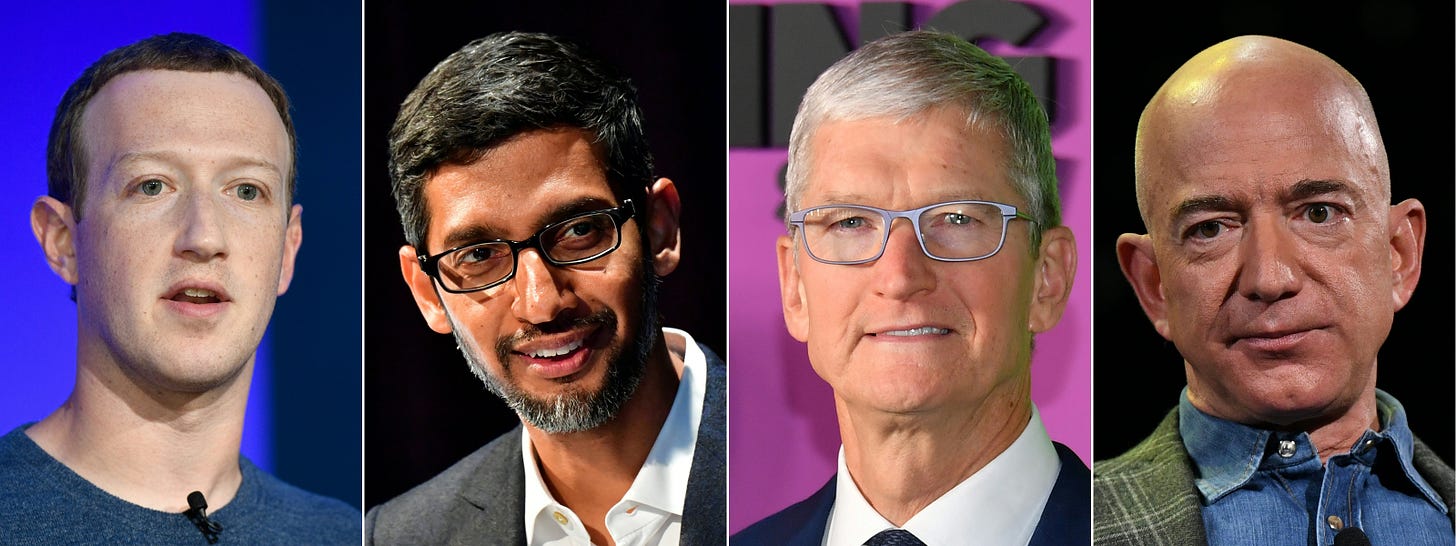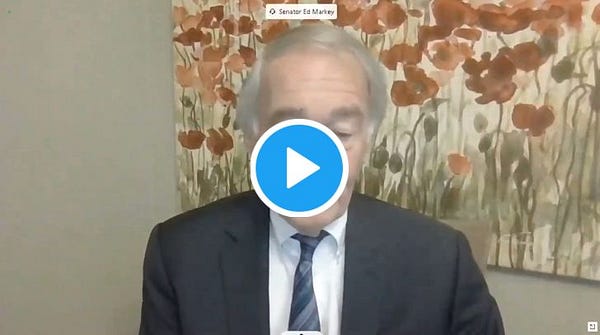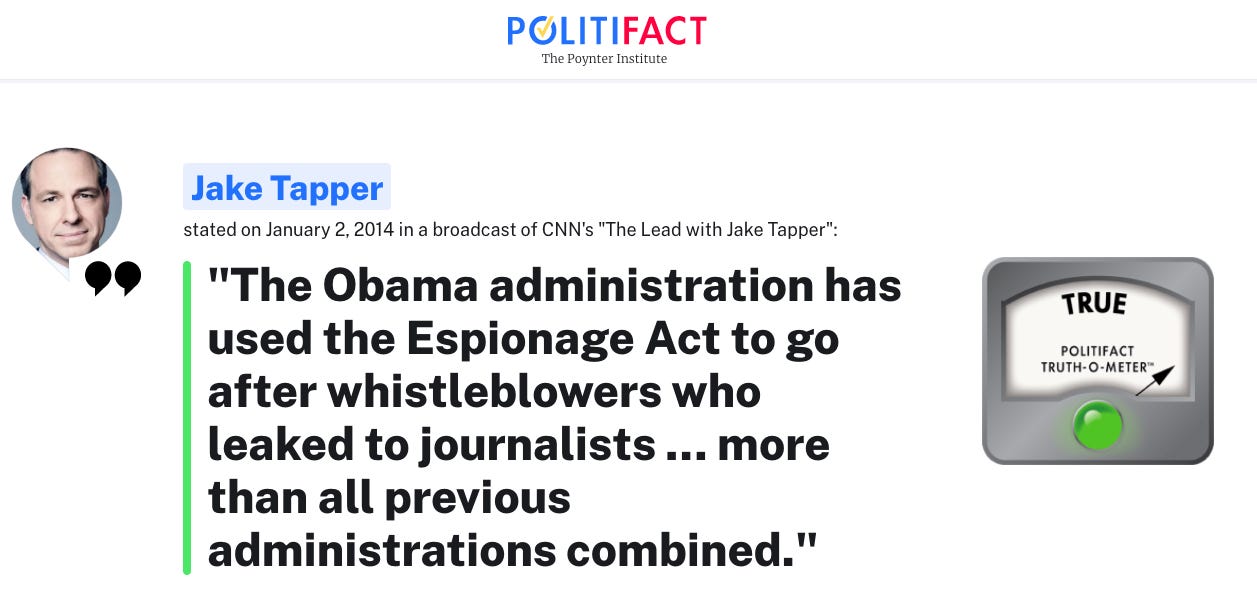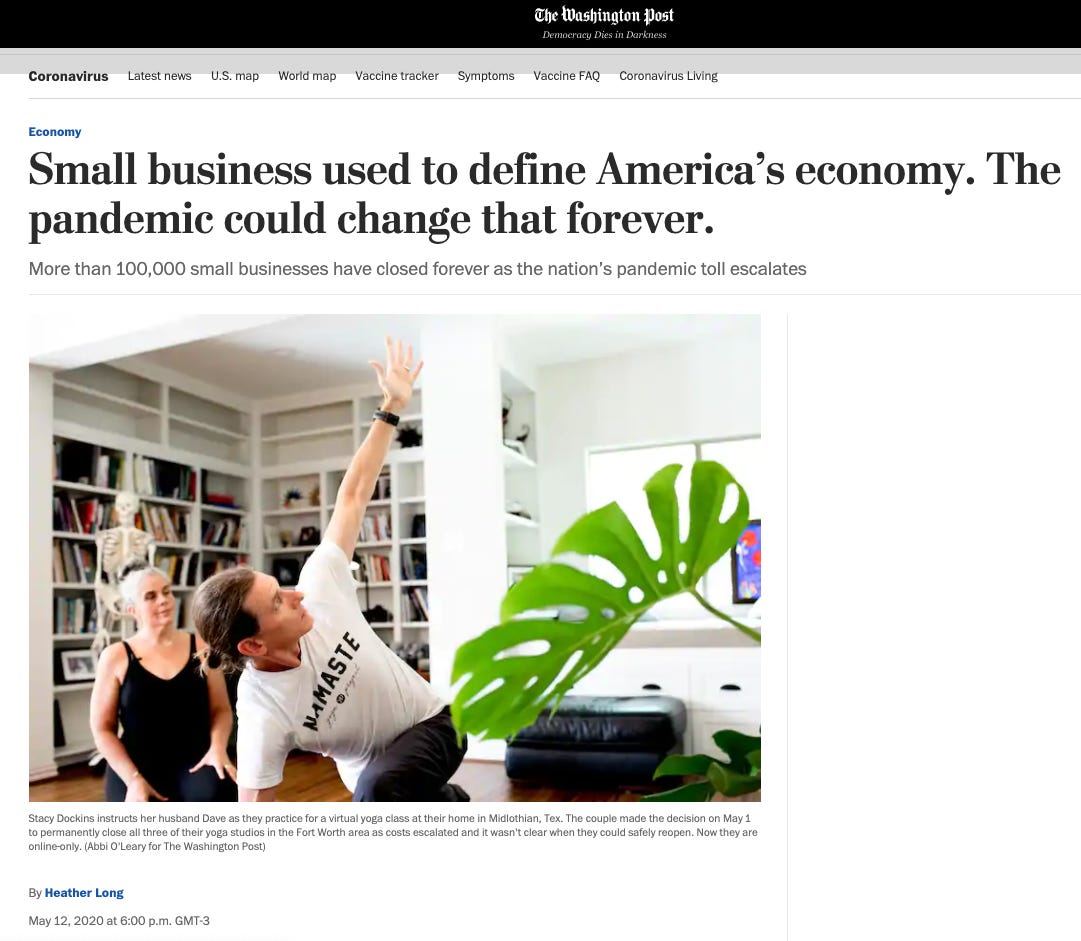The Threat of Authoritarianism in the U.S. is Very Real, and Has Nothing To Do With Trump
The COVID-driven centralization of economic power and information control in the hands of a few corporate monopolies poses enduring threats to political freedom.

Asserting that Donald Trump is a fascist-like dictator threatening the previously sturdy foundations of U.S. democracy has been a virtual requirement over the last four years to obtain entrance to cable news Green Rooms, sinecures as mainstream newspaper columnists, and popularity in faculty lounges. Yet it has proven to be a preposterous farce.
In 2020 alone, Trump had two perfectly crafted opportunities to seize authoritarian power — a global health pandemic and sprawling protests and sustained riots throughout American cities — and yet did virtually nothing to exploit those opportunities. Actual would-be despots such as Hungary’s Viktor Orbán quickly seized on the virus to declare martial law, while even prior U.S. presidents, to say nothing of foreign tyrants, have used the pretext of much less civil unrest than what we saw this summer to deploy the military in the streets to pacify their own citizenry.
But early in the pandemic, Trump was criticized, especially by Democrats, for failing to assert the draconian powers he had, such as commandeering the means of industrial production under the Defense Production Act of 1950, invoked by Truman to force industry to produce materials needed for the Korean War. In March, The Washington Post reported that “Governors, Democrats in Congress and some Senate Republicans have been urging Trump for at least a week to invoke the act, and his potential 2020 opponent, Joe Biden, came out in favor of it, too,” yet “Trump [gave] a variety of reasons for not doing so.” Rejecting demands to exploit a public health pandemic to assert extraordinary powers is not exactly what one expects from a striving dictator.
A similar dynamic prevailed during the sustained protests and riots that erupted after the killing of George Floyd. While conservatives such as Sen. Tom Cotton (R-AK), in his controversial New York Times op-ed, urged the mass deployment of the military to quell the protesters, and while Trump threatened to deploy them if governors failed to pacify the riots, Trump failed to order anything more than a few isolated, symbolic gestures such as having troops use tear gas to clear out protesters from Lafayette Park for his now-notorious walk to a church, provoking harsh criticism from the right, including Fox News, for failing to use more aggressive force to restore order.
Virtually every prediction expressed by those who pushed this doomsday narrative of Trump as a rising dictator — usually with great profit for themselves — never materialized. While Trump radically escalated bombing campaigns he inherited from Bush and Obama, he started no new wars. When his policies were declared by courts to be unconstitutional, he either revised them to comport with judicial requirements (as in the case of his “Muslim ban”) or withdrew them (as in the case of diverting Pentagon funds to build his wall). No journalists were jailed for criticizing or reporting negatively on Trump, let alone killed, as was endlessly predicted and sometimes even implied. Bashing Trump was far more likely to yield best-selling books, social media stardom and new contracts as cable news “analysts” than interment in gulags or state reprisals. There were no Proud Boy insurrections or right-wing militias waging civil war in U.S. cities. Boastful and bizarre tweets aside, Trump’s administration was far more a continuation of the U.S. political tradition than a radical departure from it.
The hysterical Trump-as-despot script was all melodrama, a ploy for profits and ratings, and, most of all, a potent instrument to distract from the neoliberal ideology that gave rise to Trump in the first place by causing so much wreckage. Positing Trump as a grand aberration from U.S. politics and as the prime author of America’s woes — rather than what he was: a perfectly predictable extension of U.S politics and a symptom of preexisting pathologies — enabled those who have so much blood and economic destruction on their hands not only to evade responsibility for what they did, but to rehabilitate themselves as the guardians of freedom and prosperity and, ultimately, catapult themselves back into power. As of January 20, that is exactly where they will reside.
The Trump administration was by no means free of authoritarianism: his Justice Department prosecuted journalists’ sources; his White House often refused basic transparency; War on Terror and immigration detentions continued without due process. But that is largely because, as I wrote in a Washington Post op-ed in late 2016, the U.S. Government itself is authoritarian after decades of bipartisan expansion of executive powers justified by a posture of endless war. With rare exception, the lawless and power-abusing acts over the last four years were ones that inhere in the U.S. Government and long preceded Trump, not ones invented by him. To the extent Trump was an authoritarian, he was one in the way that all U.S. presidents have been since the War on Terror began and, more accurately, since the start of the Cold War and advent of the permanent national security state.
The single most revealing episode exposing this narrative fraud was when journalists and political careerists, including former Obama aides, erupted in outrage on social media upon seeing a photo of immigrant children in cages at the border — only to discover that the photo was not from a Trump concentration camp but an Obama-era detention facility (they were unaccompanied children, not ones separated from their families, but “kids in cages” are “kids in cages” from a moral perspective). And tellingly, the single most actually authoritarian Trump-era event is one that has been largely ignored by the U.S. media: namely, the decision to prosecute Julian Assange under espionage laws (but that, too, is an extension of the unprecedented war on journalism unleashed by the Obama DOJ).
The last gasp for those clinging to the Trump-as-dictator fantasy (which was really hope masquerading as concern, since putting yourself on the front lines, bravely fighting domestic fascism, is more exciting and self-glorifying, not to mention more profitable, than the dreary, mediocre work of railing against an ordinary and largely weak one-term president) was the hysterical warning that Trump was mounting a coup in order to stay in office. Trump’s terrifying “coup” consisted of a series of failed court challenges based on claims of widespread voter fraud — virtually inevitable with new COVID-based voting rules never previously used — and lame attempts to persuade state officials to overturn certified vote totals. There was never a moment when it appeared even remotely plausible that it would succeed, let alone that he could secure the backing of the institutions he would need to do so, particularly senior military leaders.
Whether Trump secretly harbored despotic ambitions is both unknowable and irrelevant. If he did, he never exhibited the slightest ability to carry them out or orchestrate a sustained commitment to executing a democracy-subverting plot. And the most powerful U.S. institutions — the intelligence community and military brass, Silicon Valley, Wall Street, and the corporate media — opposed and subverted him from the start. In sum, U.S. democracy, in whatever form it existed when Trump ascended to the presidency, will endure more or less unchanged once he leaves office on January 20, 2021.
Whether the U.S. was a democracy in any meaningful sense prior to Trump had been the subject of substantial scholarly debate. A much-discussed 2014 study concluded that economic power has become so concentrated in the hands of such a small number of U.S. corporate giants and mega-billionaires, and that this concentration in economic power has ushered in virtually unchallengeable political power in their hands and virtually none in anyone else’s, that the U.S. more resembles oligarchy than anything else:
The central point that emerges from our research is that economic elites and organized groups representing business interests have substantial independent impacts on U.S. government policy, while mass-based interest groups and average citizens have little or no independent influence. Our results provide substantial support for theories of Economic-Elite Domination and for theories of Biased Pluralism, but not for theories of Majoritarian Electoral Democracy or Majoritarian Pluralism.
The U.S. Founders most certainly did not envision or desire absolute economic egalitarianism, but many, probably most, feared — long before lobbyists and candidate dependence on corporate SuperPACs — that economic inequality could become so severe, wealth concentrated in the hands of so few, that it would contaminate the political realm, where those vast wealth disparities would be replicated, rendering political rights and legal equality illusory.
But the premises of pre-Trump debates over how grave a problem this is have been rendered utterly obsolete by the new realities of the COVID era. A combination of sustained lockdowns, massive state-mandated transfers of wealth to corporate elites in the name of legislative “COVID relief,” and a radically increased dependence on online activities has rendered corporate behemoths close to unchallengeable in terms of both economic and political power.
The lockdowns from the pandemic have ushered in a collapse of small businesses across the U.S. that has only further fortified the power of corporate giants. “Billionaires increased their wealth by more than a quarter (27.5%) at the height of the crisis from April to July, just as millions of people around the world lost their jobs or were struggling to get by on government schemes,” reported The Guardian in September. A study from July told part of the story:
The combined wealth of the world's super-rich reached a new peak during the coronavirus pandemic, according to a study published by the consulting firm PwC and the Swiss bank UBC on Wednesday. The more than 2,000 billionaires around the world managed to amass fortunes totalling around $10.2 trillion (€8.69 trillion) by July, surpassing the previous record of $8.9 trillion reached in 2017.
Meanwhile, though exact numbers are unknown, “roughly one in five small businesses have closed,” AP notes, adding: “restaurants, bars, beauty shops and other retailers that involve face-to-face contact have been hardest hit at a time when Americans are trying to keep distance from one another.”
Employees are now almost completely at the mercy of a handful of corporate giants which are thriving, far more trans-national than with any allegiance to the U.S. A Brookings Institution study this week — entitled “Amazon and Walmart have raked in billions in additional profits during the pandemic, and shared almost none of it with their workers” — found that “the COVID-19 pandemic has generated record profits for America’s biggest companies, as well as immense wealth for their founders and largest shareholders—but next to nothing for workers.”
These COVID “winners” are not the Randian victors in free market capitalism. Quite the contrary, they are the recipients of enormous amounts of largesse from the U.S. Government, which they control through armies of lobbyists and donations and which therefore constantly intervenes in the market for their benefit. This is not free market capitalism rewarding innovative titans, but rather crony capitalism that is abusing the power of the state to crush small competitors, lavish corporate giants with ever more wealth and power, and turn millions of Americans into vassals whose best case scenario is working multiple jobs at low hourly wages with no benefits, few rights, and even fewer options.
Those most disgusted by this outcome should not be socialists but capitalists: this is a classic merger of state and corporate power —- also known as a hallmark of fascism in its most formal expression — that abuses state interference in markets to consolidate and centralize authority in a small handful of actors in order to disempower everyone else. Those trends were already quite visible prior to Trump and the onset of the pandemic, but have accelerated beyond anyone’s dreams in the wake of mass lockdowns, shutdowns, prolonged isolation and corporate welfare thinly disguised as legislative “relief.”
What makes this most menacing of all is that the primary beneficiaries of these rapid changes are Silicon Valley giants, at least three of which — Facebook, Google, and Amazon — are now classic monopolies. That the wealth of their primary owners and executives — Mark Zuckerberg, Jeff Bezos, Sundar Pichai — has skyrocketed during the pandemic is well-covered, but far more significant is the unprecedented power these companies exert over the dissemination of information and conduct of political debates, to say nothing of the immense data they possess about our lives by virtue of online surveillance.
Stay-at-home orders, lockdowns and social isolation have meant that we rely on Silicon Valley companies to conduct basic life functions more than ever before. We order online from Amazon rather than shop; we conduct meetings online rather than meet in offices; we use Google constantly to navigate and communicate; we rely on social media more than ever to receive information about the world. And exactly as a weakened population’s dependence on them has increased to unprecedented levels, their wealth and power has reached all new heights, as has their willingness to control and censor information and debate.
That Facebook, Google and Twitter are exerting more and more control over our political expression is hardly contestable. What is most remarkable, and alarming, is that they are not so much grabbing these powers as having them foisted on them, by a public — composed primarily of corporate media outlets and U.S. establishment liberals — who believe that the primary problem of social media is not excessive censorship but insufficient censorship. As Sen. Ed Markey (D-MA) told Mark Zuckerberg when four Silicon Valley CEOs appeared before the Senate in October: "The issue is not that the companies before us today is that they're taking too many posts down. The issue is that they're leaving too many dangerous posts up."


As I told the online program Rising this week when asked what the worst media failings of 2020 are, I continue to view the brute censorship by Facebook of incriminating reporting about Joe Biden in the weeks before the election as one of the most significant, and menacing, political events of the last several years. That this censorship was announced by a Facebook corporate spokesman who had spent his career previously as a Democratic Party apparatchik provided the perfect symbolic expression of this evolving danger.
These tech companies are more powerful than ever, not only because of their newly amassed wealth at a time when the population is suffering, but also because they overwhelmingly supported the Democratic Party candidate about to assume the presidency. Predictably, they are being rewarded with numerous key positions in his transition team and the same will ultimately be true of the new administration.
The Biden/Harris administration clearly intends to do a great deal for Silicon Valley, and Silicon Valley is well-positioned to do a great deal for them in return, starting with their immense power over the flow of information and debate.
The dominant strain of U.S. neoliberalism — the ruling coalition that has now consolidated power again — is authoritarianism. They view those who oppose them and reject their pieties not as adversaries to be engaged but as enemies, domestic terrorists, bigots, extremists and violence-inciters to be fired, censored, and silenced. And they have on their side — beyond the bulk of the corporate media, and the intelligence community, and Wall Street — an unprecedentedly powerful consortium of tech monopolies willing and able to exert greater control over a population that has rarely, if ever, been so divided, drained, deprived and anemic.
All of these authoritarian powers will, ironically, be invoked and justified in the name of stopping authoritarianism — not from those who wield power but from the movement that was just removed from power. Those who spent four years shrieking to great profit about the dangers of lurking “fascism” will — without realizing the irony — now use this merger of state and corporate power to consolidate their own authority, control the contours of permissible debate, and silence those who challenge them even further. Those most vocally screaming about growing authoritarianism in the U.S. over the last four years were very right in their core warning, but very wrong about the real source of that danger.








The danger posed by Mr. Trump was his attempt to bypass the gatekeepers in the media by communicating with the public directly using Twitter. Fortunately, Twitter has now set filters to prevent this from happening again. With any luck, there will be no possibility of future collusion between a President and the citizenry. Democracy, as we know it, has been saved.
Public education is the opium of the people. It’s a drone factory producing meat bags incapable of reason. Of course Donald Trump is a tyrant. Their teachers who are “like really smart” told them so. The professional teleprompter readers also confirm this. And for the especially dim witted, Hollywood follows up with confirmation.
Tyranny is what the left practices. Intolerance of diverse opinions and threats of violence and actual violence from their paramilitary arm, antifa etc.